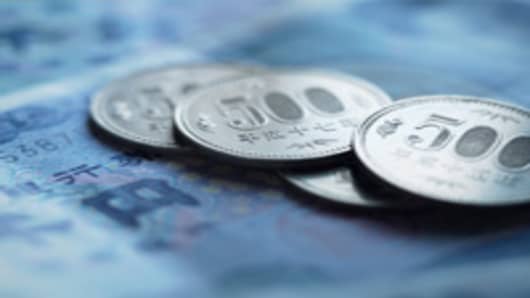Some on Wall Street are saying that the tragic Japanese earthquake at the end of last week will barely dent economic growth in the nation and that a rebuilding effort could push its stock market to a new high for the year—but they haven't made believers out of everybody.
Among the optimists, Credit Suisse believes the earthquake will shave just 0.2 percent off Japan's economic growth this year and that the Nikkei will finish at 11,000, representing a quite respectable 7.5 percent return for 2011.
Deutsche Bank and PNC also played down the overall economic effect that the earthquake, turned tsunami, turned nuclear disaster will have on the world’s third largest economy.
“The Japanese economy should show slower GDP growth than would have otherwise been the case for roughly the first half of 2011,” wrote Bill Stone, PNC Chief Investment Strategist, in a note today. “This should be followed by better economic growth, driven by the rebuilding and the continued resumption of economic activity in the affected areas.”
Deutsche Bank economist Joseph Lavorgna, whose firm’s pre-earthquake 2011 estimate on GDP growth was 1.6 percent, points out that following the January 1995 Kobe earthquake, Japan’s stock market made it back to a new high by the end of that year.
Still, while Japanese stocks and the U.S.-Listed ETF closed off their lows from Monday on the back of those calls, many investors say such opinions simply defy logic.
“The idea that a natural disaster is good for the economy because destroyed infrastructure needs to be rebuilt is complete bunk,” said Peter Schiff, president of Euro Pacific Capital. “Resources used to rebuild are not available for other purposes. So instead of adding new infrastructure, or producing additional goods or services, the Japanese now need to use those resources merely to replace what they lost.”
Schiff cited the “Broken Window” analogy used by economist Henry Hazlitt a generation ago, which debunked the stimulating effects of an externalshock by pointing out that any temporary gain from rebuilding is outweighed by the longer-term opportunity costs.
“A post-disaster cleanup boosts a country’s GDP in the short run, but hurts the government’s operating budget and increases its debt burden to the extent debt is used to fund the clean-up,” said Sean Egan, president of Egan Jones ratings agency. “If disasters were a net positive economically, then governments should make a policy of destroying a portion of its sound infrastructure on a regular basis.”
What made for such a strong comeback from Kobe back in 1995 was a more solid economic footing and a younger population more than willing to invest in the country. In 1995, Japan’s debt-to-GDP ratio was just 90 percent, so the additional financing for the rebuilding came easily. Today, Japan’s debt equals almost double its economic output and its population is aging rapidly, meaning it may be forced to go outside the country for its rebuilding financing.
“Japan has avoided this deficit financing end-game, because the nation has been able to finance 95 percent of its debt at home,” said Larry McDonald, of the McDonald Advisory Group, in a note to clients. “If Japan had to borrow at France’s rates, the interest burden alone would bankrupt the island nation.”
Another problem with those making that comparison is that this latest earthquake was more than 350 times more powerful than Kobe and involves serious threats to Japan’s nuclear power infrastructure, where the country gets a quarter of its electricity today.
“The economists are using Kobe as a template, but the nuclear situation changes the calculus,” said Brian Kelly of Kanundrum Capital. “If those towns are contaminated, they will remain ghost towns. Plus, this is a population that needs to spend, not save anymore.”
For the best market insight, catch 'Fast Money' each night at 5pm ET, and the ‘Halftime Report’ each afternoon at 12:30 ET on CNBC.
______________________________________________________
Got something to say? Send us an e-mail at fastmoney-web@cnbc.com and your comment might be posted on the Rapid Recap! If you'd prefer to make a comment, but not have it published on our Web site, send your message to fastmoney@cnbc.com.



